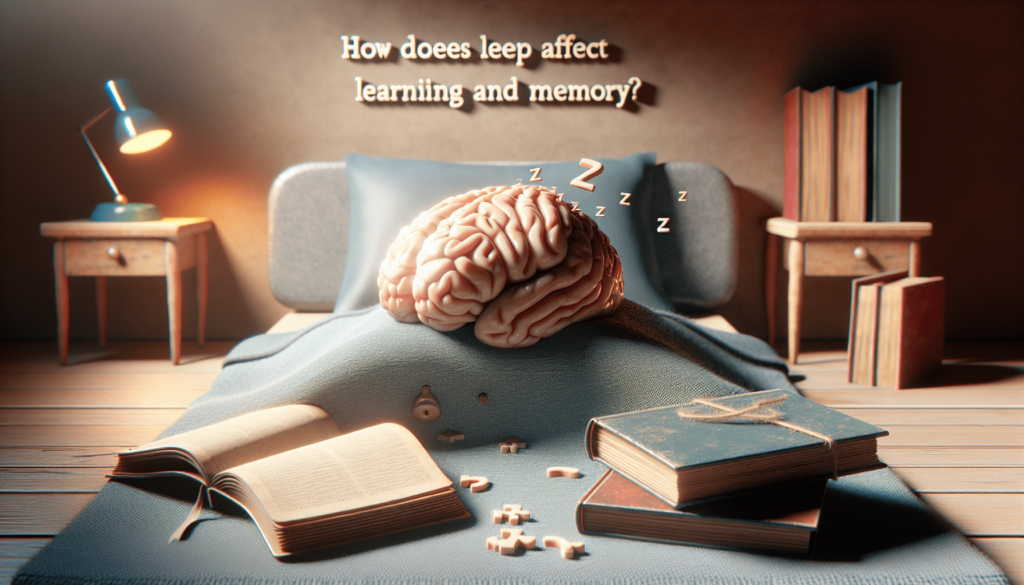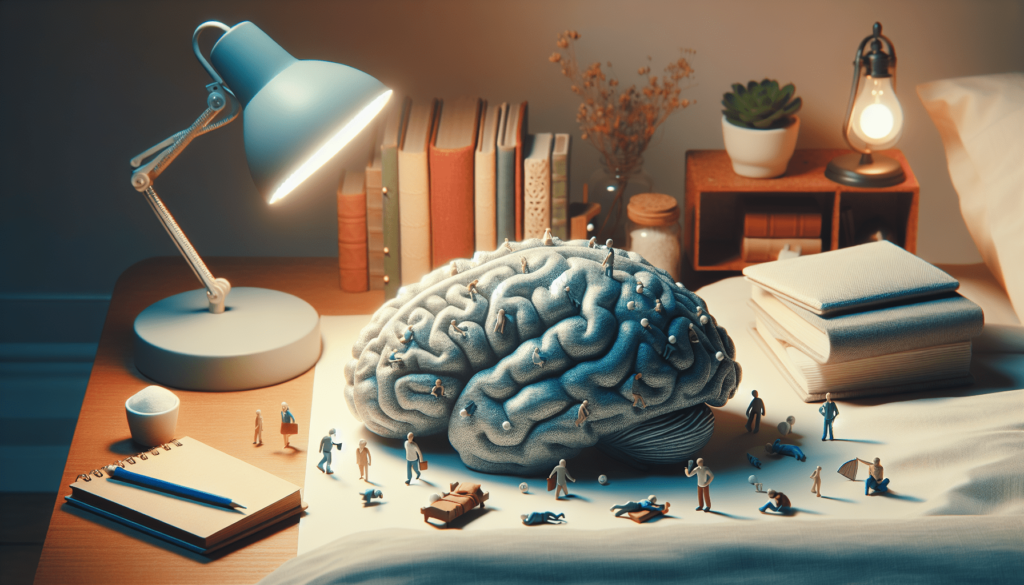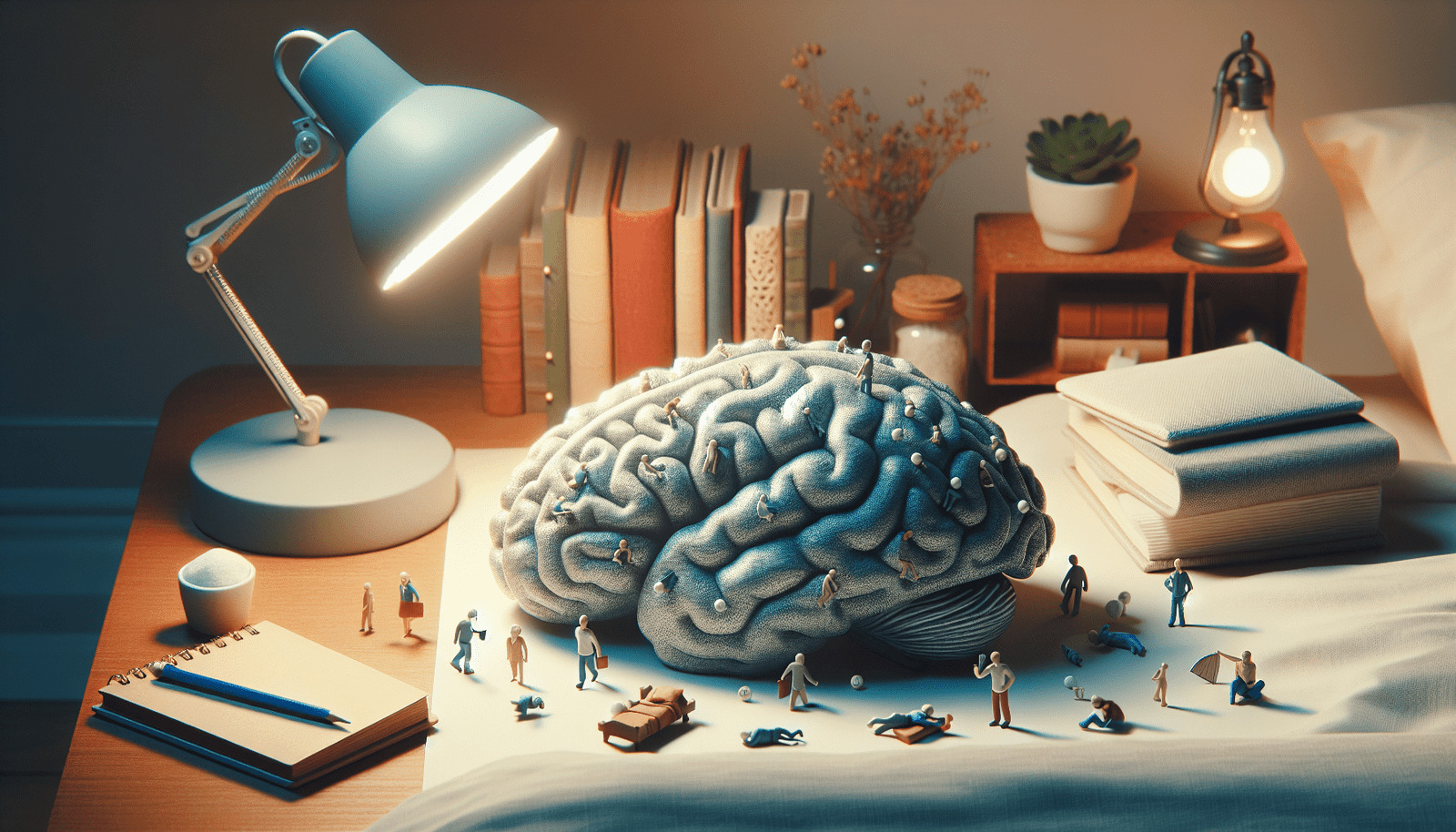Ever wonder what happens to your brain when you sleep? The impact of sleep on our learning and memory has long been a subject of fascination for scientists. It turns out, the quality and quantity of our sleep play a vital role in determining how well our brains retain and process information. From consolidating memories to enhancing cognitive functions, sleep has a powerful influence on our ability to learn and remember. So, let’s explore the intricate relationship between sleep, learning, and memory, and uncover how a good night’s rest is essential for optimal cognitive functioning.

The Importance of Sleep
Introduction to sleep
Sleep is an essential part of our daily lives, allowing our bodies and minds to recharge and restore. It is a crucial time for our brains to consolidate memories and process information, playing a vital role in learning and memory. Understanding the different stages of sleep and the recommended duration can help us optimize our sleep habits for improved cognitive function.
Stages of sleep
Sleep consists of two main stages: non-rapid eye movement (NREM) sleep and rapid eye movement (REM) sleep. NREM sleep can be further divided into four stages, with each stage characterized by different brain wave patterns. In contrast, REM sleep is associated with vivid dreaming. These stages play a critical role in memory processing and consolidation, with different information being processed in each stage.
Recommended sleep duration
The National Sleep Foundation recommends different sleep durations depending on age. Adults typically need 7-9 hours of sleep per night, while teenagers require 8-10 hours. Children and infants need even more sleep, with recommended durations ranging from 9 to 17 hours depending on their age. Adequate sleep duration is essential for optimal learning and memory retention.
Sleep and Learning
Sleep’s role in memory consolidation
During sleep, the brain goes through a process called memory consolidation. This process involves the strengthening and integration of newly acquired information into existing memory networks. Sleep promotes the transfer of memories from short-term storage to long-term storage, enhancing the retention and recall of learned material. Without sufficient sleep, this consolidation process may be disrupted, leading to difficulties in learning and memory retrieval.
Impact of sleep deprivation on learning
Sleep deprivation has detrimental effects on learning and memory. It impairs a person’s ability to focus, pay attention, and retain information. Lack of sleep negatively affects the hippocampus, a brain region crucial for memory formation. Sleep-deprived individuals often struggle to absorb new information effectively, leading to decreased academic performance and reduced cognitive abilities.
Benefits of napping for learning
Napping can have positive effects on learning and memory. Short power naps, typically 10-20 minutes in duration, can enhance alertness and improve cognitive function. Napping has been shown to boost memory consolidation, allowing the brain to solidify recently acquired information. Incorporating naps into daily routines, especially during periods of intense learning, can provide a valuable mental rejuvenation and support memory enhancement.
Sleep and Memory
Sleep’s effect on memory retention
Sleep plays an essential role in memory retention. Research suggests that memories are actively processed during sleep, with the brain selectively strengthening certain memories while disregarding others. This process, called memory replay, helps to consolidate memories and reinforce connections between neural networks. Adequate sleep ensures optimal memory retention and improves the ability to recall information when needed.
Different phases of sleep and memory processing
Different phases of sleep contribute to different aspects of memory processing. NREM sleep, particularly slow-wave sleep (SWS), is associated with the consolidation of declarative memories, such as facts and events. REM sleep, on the other hand, is linked to the consolidation of procedural memories, including skills and motor tasks. The alternation between NREM and REM sleep throughout the night allows for a comprehensive memory consolidation process.
Sleep’s impact on emotional memory
Sleep also plays a crucial role in the processing of emotional memories. During sleep, the brain modulates emotional responses and helps regulate emotions linked to past experiences. Adequate sleep can enhance emotional resilience and facilitate the integration of emotional memories into our overall cognitive framework, contributing to our overall well-being and mental health.

Neurological Mechanisms
Brain regions involved in sleep and memory
Sleep and memory processes involve various brain regions. The hippocampus, known for its role in memory formation, plays a vital role in memory consolidation during sleep. The neocortex, responsible for higher cognitive functions, works in conjunction with the hippocampus to process and consolidate memories. Additionally, the prefrontal cortex, involved in decision-making and executive functions, regulates memory retrieval during sleep.
Neural processes during sleep
Research has shown that sleep supports neural plasticity, the ability of the brain to reorganize and form new connections. During sleep, the brain undergoes neural processes that strengthen synapses and promote cellular repair. The reactivation and replay of neural patterns during sleep contribute to memory consolidation and the formation of new connections, optimizing learning and memory storage.
Hormonal changes during sleep
Sleep also influences hormonal regulation in the body. During sleep, the body releases growth hormone, which plays a crucial role in tissue repair and regeneration. This hormone is necessary for promoting optimal brain function and supporting memory consolidation. Adequate sleep duration is important for maintaining a healthy hormonal balance, allowing for optimal cognitive performance.
Effects of Sleep Disorders
Insomnia and its impact on learning and memory
Insomnia, a common sleep disorder characterized by difficulty falling or staying asleep, can significantly impact learning and memory. Chronic insomnia disrupts the consolidation of newly acquired information and impairs cognitive function. Sleep-deprived individuals with insomnia often experience difficulties in attention, concentration, and memory retrieval, hindering their ability to learn and perform cognitive tasks efficiently.
Sleep apnea and memory impairment
Sleep apnea, a sleep disorder characterized by pauses in breathing during sleep, can lead to fragmented sleep and oxygen deprivation. These disruptions can impair memory consolidation and cognitive function. Sleep apnea has been associated with memory deficits, attention problems, and decreased learning abilities. Effective treatment of sleep apnea is crucial for improving memory and overall cognitive performance.
Restless legs syndrome and cognitive function
Restless Legs Syndrome (RLS) is a condition characterized by an uncontrollable urge to move the legs, often accompanied by uncomfortable or unpleasant sensations. RLS can significantly impact sleep quality, leading to sleep deprivation and subsequent cognitive impairment. Individuals with RLS may experience difficulties in concentration, attention, and memory. Managing RLS symptoms and improving sleep quality is critical for maintaining cognitive function.
Age and Sleep
Sleep patterns and memory development in infants
Sleep patterns play a crucial role in memory development, especially in infants. Infants spend a significant amount of time in REM sleep, which is thought to play a role in early brain development and learning. The consolidation of new information and experiences occurs during sleep, supporting the development of memory and cognitive abilities in infancy.
Sleep deprivation in adolescents and learning difficulties
Adolescents often face challenges with sleep deprivation due to factors such as school demands, social activities, and technology use. Sleep deprivation in adolescents can lead to difficulties in learning and memory. Insufficient sleep affects attention, alertness, and problem-solving abilities, hindering their academic performance and overall cognitive development. Educating adolescents about the importance of sleep and implementing healthy sleep habits are crucial for their learning outcomes.
Sleep changes in older adults and memory problems
As we age, sleep patterns change, with older adults experiencing more fragmented sleep and decreased amounts of deep sleep. These changes can affect memory consolidation and lead to memory problems. Older adults may experience difficulties in learning new information, recalling details, and maintaining cognitive sharpness. Prioritizing healthy sleep habits and implementing strategies for improving sleep quality can help mitigate memory issues in older adults.
Optimizing Sleep for Learning and Memory
Creating a conducive sleep environment
Creating a conducive sleep environment is essential for optimizing sleep quality. Keeping the bedroom cool, dark, and quiet can promote uninterrupted sleep. Using comfortable bedding and pillows, as well as removing electronic devices from the bedroom, can further enhance sleep environment. Establishing a relaxing bedtime routine, such as reading or practicing relaxation techniques, can also signal the body and mind to prepare for sleep.
Developing consistent sleep habits
Maintaining consistent sleep habits can improve sleep quality and enhance learning and memory. Going to bed and waking up at the same time each day helps regulate the body’s internal clock and promotes a regular sleep-wake cycle. Avoiding stimulants such as caffeine, nicotine, and electronic devices close to bedtime can also help prepare the body for sleep. Consistency in sleep habits establishes a healthy sleep routine, optimizing cognitive performance.
Implementing power naps for memory enhancement
Power naps, short periods of sleep during the day, can help enhance memory and cognitive function. Napping for 10-20 minutes can improve alertness, enhance mood, and boost cognitive performance. However, napping for longer durations or too close to bedtime can disrupt nighttime sleep. By strategically incorporating power naps into daily routines, individuals can reap the benefits of improved memory consolidation without compromising nighttime sleep quality.
Sleep and Academic Performance
Link between sleep quality and academic achievement
Sleep quality has a significant impact on academic achievement. Adequate sleep duration and quality enhance attention, concentration, and memory formation, all crucial for successful learning. Students who consistently get enough sleep tend to perform better academically, have improved problem-solving skills, and demonstrate higher levels of creativity. Prioritizing sleep as part of an overall academic routine can lead to enhanced learning outcomes.
Strategies for improving sleep to enhance learning outcomes
Implementing strategies for improving sleep can positively impact learning outcomes. Setting a regular sleep schedule, creating a comfortable sleep environment, and reducing stimuli before bedtime can improve sleep quality. Engaging in relaxation techniques, such as deep breathing or meditation, can promote better sleep initiation. Establishing healthy sleep habits alongside effective study techniques can optimize learning and memory for improved academic performance.
The role of sleep education in schools
Integrating sleep education into schools can contribute to better learning and memory outcomes. Educating students about the importance of sleep, the effects of sleep deprivation, and strategies for optimal sleep hygiene can empower them to prioritize sleep as part of their overall well-being. Teaching sleep hygiene practices alongside academic subjects can foster a culture of wellness and support students in achieving their full intellectual potential.
Cognitive Benefits of Sleep
Enhanced problem-solving skills
Sleep has been shown to enhance problem-solving skills. During sleep, the brain continues to process and consolidate information, allowing for novel connections and insights to emerge. Improved memory consolidation during sleep facilitates the retrieval of relevant information and the generation of creative solutions. Getting enough sleep can improve problem-solving abilities, leading to more effective and efficient cognitive performance.
Improved creativity and innovation
Sleep has a positive impact on creativity and innovation. During sleep, the brain reorganizes and synthesizes information, allowing for the formation of new associations and insights. Dreams and sleep-related experiences can provide a source of inspiration and novel ideas. Getting sufficient sleep supports the creative process, enabling individuals to approach challenges with a fresh perspective and generate innovative solutions.
Lack of sleep and cognitive decline
Chronic lack of sleep has been associated with cognitive decline and an increased risk of neurodegenerative conditions such as Alzheimer’s disease. Sleep deprivation disrupts the brain’s ability to clear waste products and toxins, which can accumulate and impair cognitive function. Chronic sleep deprivation may contribute to long-term memory problems, cognitive decline, and an increased susceptibility to neurological disorders. Prioritizing adequate sleep can help protect cognitive health and reduce the risk of cognitive decline.
Future Directions in Research
Advancements in sleep research
Sleep research continues to advance, with new technologies and methodologies providing deeper insights into the complex relationship between sleep and memory. Advancements in neuroimaging techniques, such as functional magnetic resonance imaging (fMRI) and electroencephalography (EEG), allow researchers to monitor brain activity during sleep in unprecedented detail. With ongoing research, we can further unravel the intricate mechanisms underlying sleep’s impact on learning and memory.
Innovative approaches to studying sleep and memory
Researchers are exploring innovative approaches to studying sleep and memory, including animal models and genetic studies. Animal studies provide valuable insights into the cellular and molecular processes involved in sleep and memory consolidation. By manipulating specific genes or brain regions, scientists can gain a deeper understanding of the mechanisms underlying memory formation during sleep. These approaches are essential for uncovering new strategies for memory enhancement and potential therapeutic interventions.
Potential therapeutic interventions for memory enhancement
The exploration of potential therapeutic interventions for memory enhancement is an exciting area of research. Scientists are investigating the use of drugs that target specific neurotransmitters and brain circuits involved in sleep and memory consolidation. Additionally, non-invasive brain stimulation techniques, such as transcranial magnetic stimulation (TMS) and transcranial direct current stimulation (tDCS), are being explored as potential tools to enhance memory during sleep. Continued research in these areas may lead to novel interventions for improving learning and memory outcomes.
In conclusion, sleep plays a crucial role in learning and memory. It influences memory consolidation, emotional memory processing, and neural plasticity. Sleep disorders can impair cognitive function and memory, emphasizing the importance of addressing sleep-related issues. By optimizing sleep habits, creating a conducive sleep environment, and prioritizing sleep education, individuals can enhance their learning and memory abilities. Adequate sleep duration and quality support optimal cognitive performance, problem-solving skills, and creativity. Further research and advancements in sleep and memory studies hold promising potential for developing interventions that enhance memory and cognitive function, benefiting individuals of all ages.
